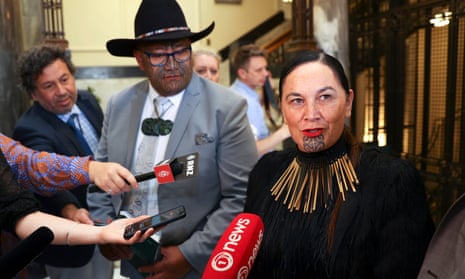The Māori party has launched a petition to change New Zealand’s official name to Aotearoa, the te reo Māori, indigenous language name for the country.
“It’s well past time that Te Reo Māori was restored to its rightful place as the first and official language of this country,” Te Pāti Māori leaders, Rawiri Waititi and Debbie Ngarewa-Packer said in a statement launching the petition. “We are a Polynesian country – we are Aotearoa.”
“Aotearoa is a name that will unify our country rather than divide it,” Waititi said. “Others are trying to use it is a divisive tool, but this is an inclusive tool, where our ancestors consented to us all living on this whenua [land] together.”
“New Zealand is a Dutch name. Even the Dutch have changed their name – from Holland to the Netherlands, for Christ’s sakes!”
The petition also calls on the government to “identify and officially restore the original Te Reo Māori names for all towns, cities and places right across the country” over the next five years, completing the process by 2026.
“Tangata whenua are sick to death of our ancestral names being mangled, bastardised, and ignored. It’s the 21st century, this must change,” the petition reads.
Te Pāti Māori said successive governments and “the imposition of a colonial agenda in the education system” had resulted in widespread language loss among Māori, with fluency dropping from 90% to 20% over the past 90 years.
“It is the duty of the Crown to do all that it can to restore the status of our language. That means it needs to be accessible in the most obvious of places; on our televisions, on our radio stations, on road signs, maps and official advertising, and in our education system.” they said.
Over time, New Zealanders, including state officials, political leaders and companies have increasingly come to use Aotearoa interchangeably with or alongside New Zealand – but the shift hasn’t been made official.
Prime minister Jacinda Ardern said last year that an official name-change, was “not something we’ve explored,” but that she supported more people using the name. “I hear more and more often the use of Aotearoa interchangeably with New Zealand and that is a positive thing,” she said.
“Whether or not we change it in law I don’t think changes the fact New Zealanders do increasingly refer to Aotearoa, and I think that’s a transition that has been welcomed.”
That transition also hasn’t been without controversy. On the right, National party leader Judith Collins has called for a referendum on the use of Aotearoa for different reasons – saying the name was being implemented “by stealth,” and National MP Stuart Smith has floated the idea of banning its use by public officials. Libertarian ACT party leader David Seymour said via Twitter: “People are already free to use Māori placenames. What the Māori Party is saying is it would like to ban people calling our country New Zealand.”
The launch of the petition comes 49 years to the day after the Māori language petition was delivered to parliament – a drive which eventually led to Māori becoming an official language.
“I acknowledge the people who laid down that challenge,” Waititi said. “In 2021, we continue to take up the challenge and continue to push further, to ensure that the mahi, the work that they have done, is not lost to the history books of time, but is continued to ensure that we are creating a better Aotearoa for our mokopuna, for the next generation to come.”
He said in the first two and a half hours of the treaty going online, it had garnered 3,000 signatures. “There is a mood for change,” Waititi said.
